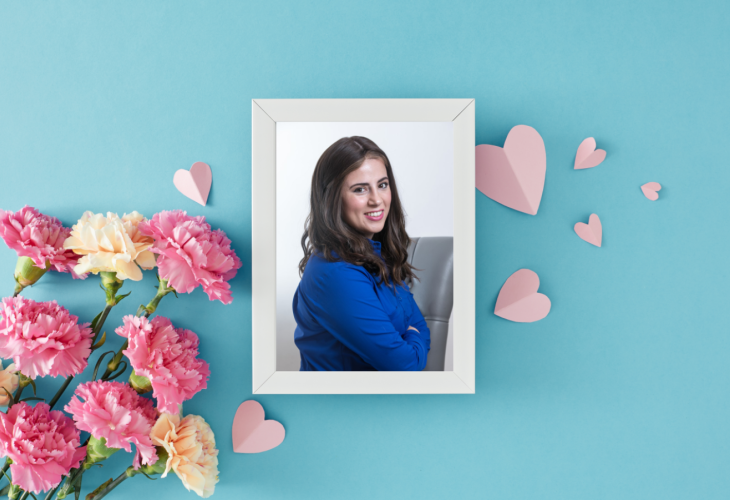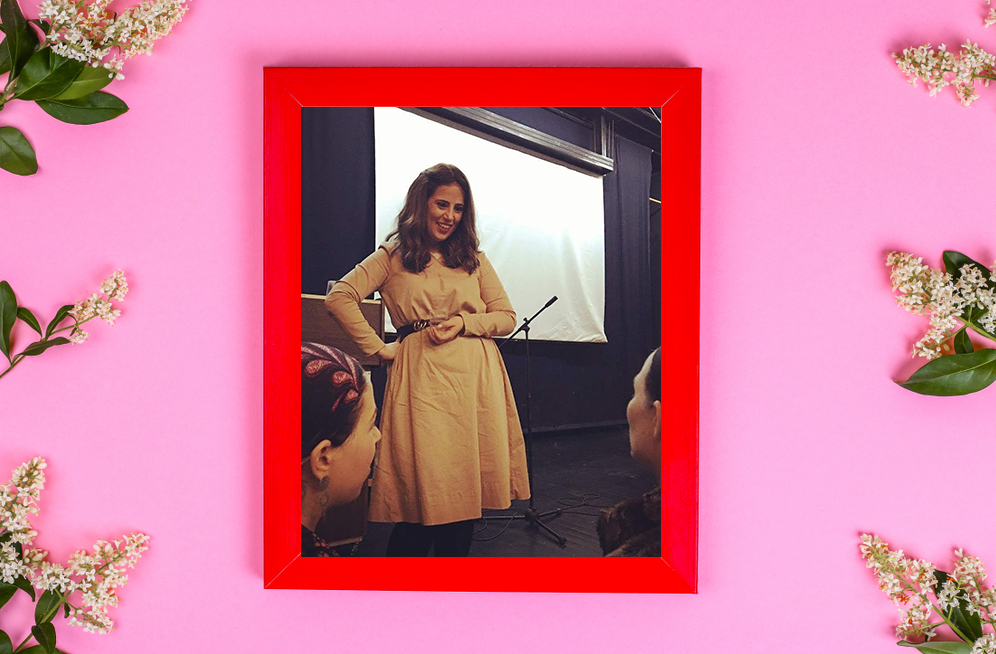Hania Shochat: "When I Left My Job for Stand-up, People Thought I Went Crazy"
After years of working in jobs she didn't love, Hania Shochat finally had the courage to make a change. She doesn't apologize for her small social media following—she refuses to be enslaved by it. Raw on stage, she believes that while Haredi humor is limited, it's also the best there is. A personal (and hilarious) interview.
 Hania Shochat (Photo: Gidi Sharon)
Hania Shochat (Photo: Gidi Sharon)Hania Shochat was living a dream many working women aspire to: she held a coveted position in a successful advertising agency as an account executive, earned well, and managed public relations accounts. Yet, something inside her always felt out of place. "It involved creativity, something I'm good at and enjoy. I launched various projects and wrote for reputable organizations like Tnuva, but it always felt like 'almost.' I went through an entire journey to find what truly suits me."
Such is stand-up comedian Hania Shochat—very genuine. If you thought her desire to make women laugh would cause her to compromise—you're mistaken. Shochat has been a rising star for the past five years and is considered one of the sharpest and most successful Haredi comedians. But the journey there was long.
"It Took Me Years to Escape My Golden Cage"
Shochat was born in France 34 years ago. As a child, she immigrated to Israel with her mother following her parents' divorce. "It was very unusual back then, the story of divorced parents," she describes. She spent her childhood in Bnei Brak, in a modern Haredi home, and married at 19. Today, she is a mother of three.
Here, if you will, began her journey to finding a true calling that would fulfill her beyond the confines of home and family. "For 11 years, I worked in office jobs that sometimes matched my talents more, sometimes less. I ran away from being independent my whole life because my mother was independent, and I was a 'latchkey kid' who was alone at home much of the day.
"At some point, I felt I was losing myself and my connection with my children. I resigned and looked for another job, moving to a different office and taking on a different role, in accounting. I wanted a job that ended at 4 PM to peacefully return to my kids, and I felt I found a good job with good conditions, a dream for any mother in Israel. Everyone thought I was making the mistake of my life, giving up a position in an ad agency, but I felt like the happiest person in the world.
"After two or three years, I felt I couldn't do it anymore, my soul urging me to change. My husband has been independent since we married, and I always feared being independent too. We always made sure to have at least one stable salary, so we decided to consult a rabbi. The first time he told me not to leave and to take on some side writing jobs. After a year, I returned, and this time he blessed me. It was a very scary and special moment for me. I left for writing jobs, a role I became very established in."
Meanwhile, Shochat met Yiphosh Brachan, a successful Chabad singer, and together they put on a show that ran successfully for about a year. "At some point, the show fell apart," she describes, "and I was left performing alone. From there, you could say I launched a truly independent career. In hindsight, I realized I needed that bridge to develop an independent career."
 (Photo: shutterstock)
(Photo: shutterstock)It sounds like you really escaped some kind of golden cage...
"Exactly. I have a friend, a colleague, and we recently talked about performance pricing and the processes we all go through, and how change doesn't happen overnight. I feel I needed to be in that cage and enjoy it, then suffer from it and leave. Often we see friends at the same point and want to save them, but everyone has their own pace."
Since then, about five years ago, Shochat has become a respected Haredi stand-up comedian performing at different venues across the country, and she also works in radio and on the 'Kan' broadcasting corporation channel. In this role, somewhat involuntarily, she has become a 'spokesperson' for the Haredi world. "I record many videos about the Haredi world. While I don't love representing the Haredi sector, sometimes it's simply necessary, and I don't get asked, which has its costs. For example, I recently made a video on Haredi charity organizations, which was the most viewed video I've ever posted, with 3 million views. But I received a lot of harsh criticism because the timing was sensitive, and that impacted me deeply since I'm a sensitive person."
Why do you think the reactions were so harsh?
"Charity in our Haredi world is voluntary and not always recognized or discussed, but it's been happening for many years. Not to mention, it often comes at the expense of the initiators. So while we may not enlist in the army, we contribute so much in other ways. The moment you mention the word 'army' to the secular audience—it's a red flag. It's such a sensitive and painful topic, and the entry of a right-wing Haredi government greatly influenced the sentiment. Therefore, probably, 90 percent of the comments were very harsh and critical of the Haredi community. It was very hard and painful for me."
"When I'm On Stage, I Have a Special Radar for My Audience"
Today Shochat performs for women from all walks of life, in Israel and abroad. "I adapt myself to wherever I'm going. When I first started performing, it was for a Haredi seminary. I really wanted to perform for Haredi seminaries because they didn't accept me as a teenage girl, and it was a sort of victory moment for me. When I'm on stage, I have these radars; I feel what a woman in row 17 is feeling, and if a few women feel uncomfortable, I won't be satisfied.
"I work hard at not hiding anything, full of honesty, and that's one of the main feedbacks I receive. I don't pretend to be characters, which is the common comedy style in this sector. I do stand-up as it's done in the general society, but adapted for us. I strive to bring truth, including my personal truth, which comes with a cost in soul and spirit, and I bring out my vulnerabilities.

"On one hand, it's a mission. I remember years ago when my show heavily touched on divorced parents in the Haredi world, and someone from the audience shared how much it relieved her and how she related as the daughter of divorced parents. Humor is a great kindness. My insistence on truth in texts, performances, and videos is very important to me. That's why I have love-hate relations with social media. I have an Instagram account with not tens of thousands of followers, just 6,000, which is very few in comparison. But for me, it's okay because I'm not very active and not willing to waste my time on that culture."
What's it like to be someone whose work is so closely tied to humor all the time?
"I'm always busy questioning who I am: Am I a serious person or a funny one? I want to bring things with seriousness, and the laughter is just a facade, or vice versa? Most people who know me know that if I'm not in the mood to joke around, I won't. I broadcast it in my daily life that I'm not the court jester and that I am funny for pay," she laughs.
Do you feel like you're in your place today?
"Absolutely. There's always room for more growth, but I feel very blessed to use my talents and work with them in the world. As someone who wandered around in circles for many years, I felt my soul really suffered. You can't compensate with outside rewards; when it finally does what it's here to do, something in it calms down. That's what happened to me, something in me calmed after years of working in jobs I hated. But on the other hand, there's a scary bridge to cross to be in one's vocation, it's not so simple. Those willing to cross that bridge and know that Hashem is waiting halfway, at the end, in the middle—know there's a real treat at the end.
"At the same time, I always have more work to do and areas to expand. But if I pause for a moment to make a gratitude list—I truly feel blessed. I see friends tearing themselves apart for an opportunity and recognition, sometimes it comes easy, other times Hashem gives me a boost. It's also known in social psychology: when you're constantly in a state of gratitude—it heals the soul, and it multiplies."
Where does the inspiration and material for performances come from?
"From my heightened sensitivity, from the ability to fully experience situations, and from people. It genuinely comes at unexpected moments, and I pray to Hashem for many more such moments. Many good jokes have come to me with a great audience whose laughter was a powerful engine for me, opening more windows. I have entire routines that developed through improvisation, and there were those that made me forget the existing script. Truly, it's an engine, for better or worse."
You write for a Haredi audience; it's not simple and requires a lot of sensitivity. How do you create humor that is so restricted?
"It's like the Chabadniks during Pesach," she laughs, "peeling even the tomatoes they eat, yet they still end up with incredibly tasty food. In extremes, in humor it's easiest to go low. People laugh the most when they're mimicked or cursed, or when unexpected things happen, and I just try to do these things gently and with permission. If I manage to touch on helplessness and the pain of childbirth in a modest way, for example, then I've succeeded in cracking that humor element, but also without offending."
What won't you talk about as a stand-up comedian?
"About anything I wouldn't talk about at a Shabbat table. I don't feel the need to hide on stage. But, of course, within the right boundaries, one can both be emptied and filled from experiences, the question is what you choose to do. Then, you also feel that you didn't get dirty along the way and that you fulfilled a mission. For me, the most crucial part of my performance is actually the end. After an hour of laughter, there's a moment of 'Ra'ava Deravin' when the heart opens, and what I say enters the heart with a bang. I always try to use it to uplift."
Hania Shochat will soon appear on Moran Kurs' show 'Not Taken for Granted' for a personal interview about Jewish stand-up

